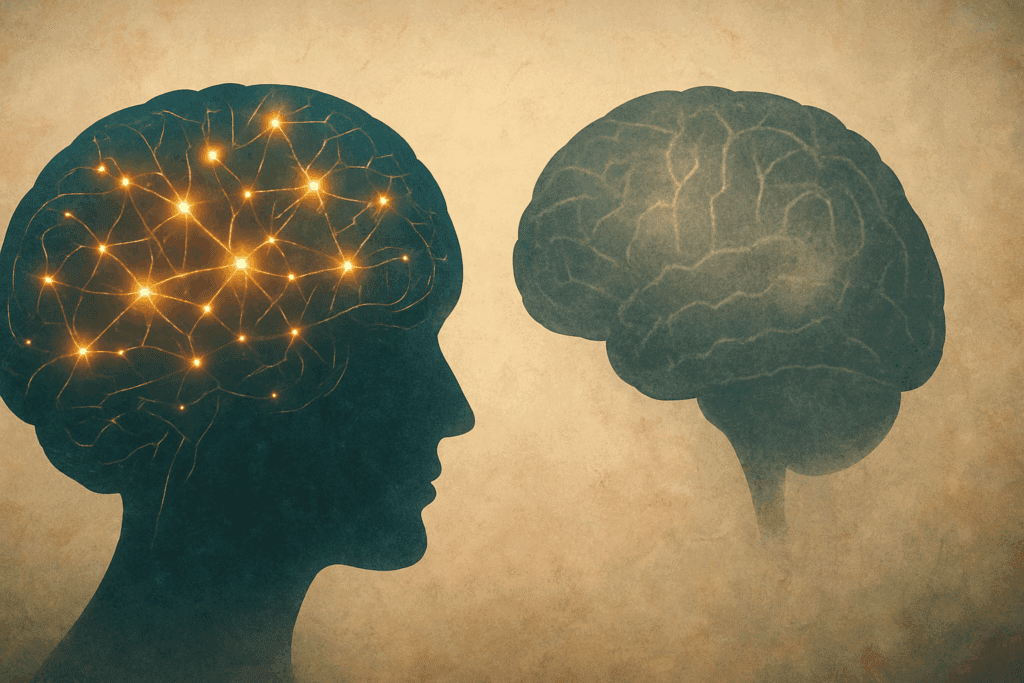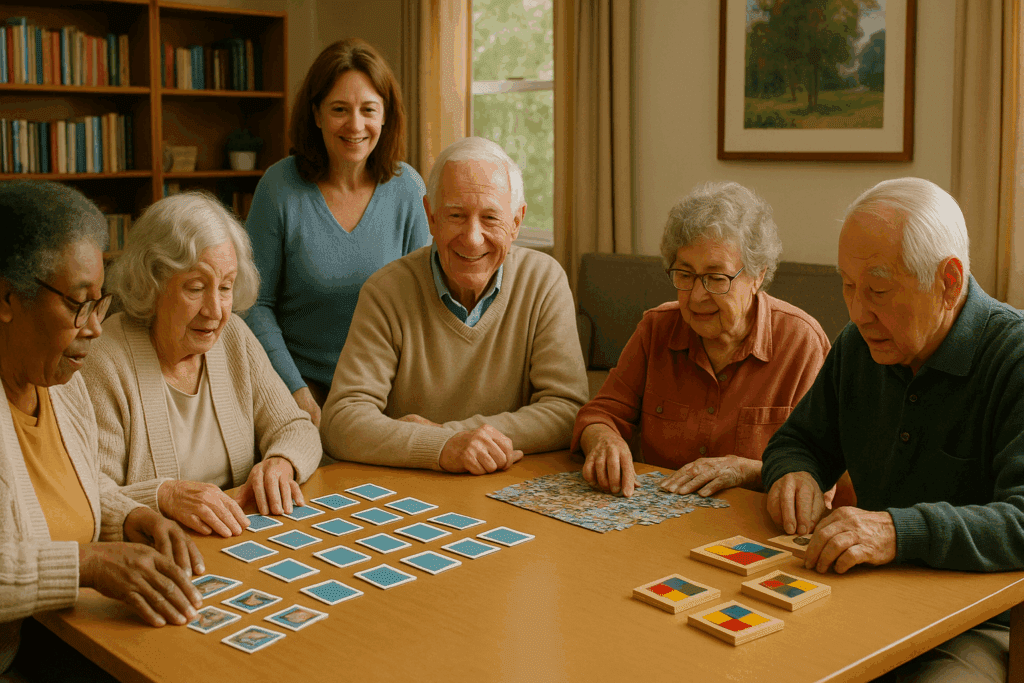The relationship between lifestyle habits and brain health has gained serious traction in the scientific community over the past few decades. As dementia becomes an increasingly urgent public health concern, more attention is being given to early prevention strategies rooted in lifestyle interventions. Of particular relevance are dementia exercises, memory care exercises, and strategic dietary choices. Together, they can play a significant role in cognitive protection, especially when implemented before serious symptoms arise. In this comprehensive article, we explore the science behind physical and cognitive workouts for dementia prevention, examine memory care exercises used by clinicians, and outline how natural dietary support can complement these practices to reduce the risk of cognitive decline.
You may also like: Best Herb for ADHD Support: How Natural Remedies and Herbs for ADHD Women May Help Boost Focus and Calm
Understanding Dementia and Its Impacts on Daily Functioning
Dementia is not a single disease but rather a collection of symptoms associated with impaired memory, reasoning, and thinking. Alzheimer’s disease is the most common form, but vascular dementia, Lewy body dementia, and frontotemporal disorders are also prevalent. One of the challenges lies in the progressive nature of the condition. As neurons deteriorate, so does an individual’s ability to recall memories, manage daily tasks, and maintain emotional stability. Understanding what is the main cause of amnesia and how it differs from chronic memory loss is essential for distinguishing between conditions. Amnesia typically arises from trauma or neurological events and may be reversible. Dementia, by contrast, involves permanent neurodegeneration. Recognizing the differential diagnosis of memory loss early in the process can help caregivers and clinicians determine the appropriate course of action.

The Importance of Early Intervention: Why Memory Care Exercises Matter
One of the most promising areas of intervention is the use of structured memory care exercises. These activities aim to stimulate neuroplasticity—the brain’s ability to reorganize itself by forming new neural connections. Cognitive training, such as puzzles, language games, and strategic memory exercises, have demonstrated measurable benefits for people in the early stages of dementia. Beyond clinical settings, caregivers and family members can introduce exercises for dementia patients that are both engaging and neurologically stimulating. These exercises not only help maintain existing cognitive functions but also contribute to emotional well-being by giving patients a sense of accomplishment and routine.
Types of Exercises for Dementia Patients: Tailoring Movement to Cognitive Health
Physical movement is more than just a tool for cardiovascular wellness; it is a profound cognitive enhancer. A dementia workout regimen that includes balance training, resistance exercises, and light aerobic activity has been shown to improve cerebral blood flow and boost neurogenesis in the hippocampus, the region of the brain critical for memory. For example, tai chi, walking groups, and dance therapy offer low-impact ways to keep the body active while also engaging motor and memory systems. These exercises for dementia sufferers are effective when they are consistent, accessible, and enjoyable. The goal is not physical intensity but neurological engagement.

Designing an Effective Dementia Workout Plan at Home
Creating a structured dementia workout plan at home is a valuable way for caregivers to support loved ones. A sample week may include alternating walking days with yoga or chair-based mobility routines. These should be paired with memory care exercises such as matching card games, sequencing tasks, or even reading aloud—activities that challenge recall and reasoning. Importantly, the best results come from combining movement and cognition. For instance, walking while engaging in conversation or playing memory games during light stretching integrates multiple brain areas simultaneously. Exercise to prevent dementia should focus on consistency over intensity, with repetition helping to strengthen neural pathways over time.
The Role of Diet in Cognitive Preservation and Brain Resilience
While movement engages the mind through physical pathways, nutrition provides the foundational elements for brain resilience. Emerging research links the Mediterranean diet and other anti-inflammatory dietary patterns with a reduced risk of Alzheimer’s and other cognitive conditions. Antioxidants found in berries, leafy greens, and fatty fish support neuronal integrity and reduce oxidative stress. Omega-3 fatty acids, in particular, have been extensively studied for their neuroprotective properties. Natural ingredients such as turmeric (curcumin), green tea, and ginkgo biloba have also shown promise in improving memory and slowing cognitive decline. When combined with dementia exercises, these foods may create a synergistic effect that enhances mental sharpness and clarity.

Memory Loss vs. Amnesia: Understanding the Medical Nuances
It’s critical to draw a clear line between chronic memory loss and acute memory events such as amnesia. Memory loss associated with dementia is typically progressive and irreversible, affecting short-term and long-term memory in stages. On the other hand, amnesia may present suddenly, often after a traumatic incident or neurological disruption, and may resolve over time. Understanding the differential diagnosis of memory loss involves analyzing the root cause, whether it’s organic brain disease, medication side effects, or psychological trauma. This distinction not only aids in accurate diagnosis but also ensures that patients receive interventions most suited to their specific needs.
Acute Memory Loss and Confusion: When to Seek Immediate Help
Instances of acute memory loss and confusion should never be dismissed lightly. Unlike the slow cognitive decline seen in dementia, these episodes are sudden and can signify medical emergencies such as stroke, head injury, infection, or metabolic imbalances. In these cases, prompt medical attention can reverse or halt further cognitive impairment. It is also during these moments that a differential diagnosis for memory loss becomes crucial. Blood tests, brain imaging, and cognitive assessments help rule out or confirm underlying causes. Caregivers should be trained to recognize red flags, particularly when memory lapses are accompanied by confusion, disorientation, or sudden changes in personality.
Cognitive Routines for Studying: How to Remember Stuff When Studying
Students and lifelong learners alike often struggle with how to remember things while studying. Memory care exercises adapted for academic use can be a game-changer. Techniques such as spaced repetition, active recall, and mind mapping help embed information deeply into long-term memory. The trick lies in frequent engagement and strategic review. For those wondering how to memorize something for a test, integrating physical movement can actually enhance results. For instance, pacing while reciting material or incorporating hand gestures can activate multiple brain areas and deepen encoding. Similar strategies can be repurposed from dementia workout routines to help healthy individuals retain academic material.

Harnessing the Power of Nutrition to Boost Academic and Cognitive Performance
Just as diet plays a critical role in slowing cognitive decline, it can also enhance learning efficiency and memory consolidation. Foods rich in choline, such as eggs, or polyphenols found in cocoa and dark berries, have been linked to improved memory retention. For students, understanding what to read for exams is only part of the equation. The brain must be nourished to function at peak capacity. Adding ingredients like rosemary or sage, known for their cognitive-enhancing effects, can provide an extra edge. These natural ingredients, alongside memory care exercises, create an optimal environment for sustained mental performance.
The Interplay Between Movement, Mind, and Memory
The connection between physical exercise and cognitive performance is more than just theoretical; it is deeply physiological. Cardiovascular workouts increase the release of brain-derived neurotrophic factor (BDNF), a protein essential for neuroplasticity. At the same time, resistance training has been linked to improvements in executive function and attention. For dementia sufferers, even mild exercises can initiate these benefits, making dementia workouts a cornerstone of long-term cognitive care. When these routines are combined with memory care exercises that challenge recall and reasoning, the dual stimulation can lead to observable improvements in daily function and mood.
Navigating Daily Life with Cognitive Challenges: Practical Tips for Caregivers
Supporting someone with memory loss can be emotionally taxing and logistically complex. However, equipping caregivers with tools and strategies grounded in neuroscience can improve outcomes for both the patient and the caregiver. Activities should be personalized based on the individual’s cognitive level and interests. For example, exercises for dementia patients who enjoy gardening can involve tasks like sorting seeds or naming plant types, integrating sensory and cognitive engagement. Meanwhile, consistency in routines, including regular dementia workouts and memory care exercises, helps reduce anxiety and confusion. Small environmental cues, such as labels or visual schedules, also support autonomy.
Natural Ingredients That May Enhance Memory and Delay Cognitive Decline
Scientific interest in natural nootropics is rapidly expanding. Substances such as Bacopa monnieri, lion’s mane mushroom, and ginkgo biloba have shown encouraging results in preliminary trials. These ingredients, often used in traditional medicine, appear to work by enhancing synaptic signaling and reducing neuroinflammation. While not a substitute for clinical treatment, they may complement memory care exercises and a brain-healthy lifestyle. It’s essential to use these supplements under professional supervision, especially for dementia sufferers who may already be on prescription medication. Personalized approaches that combine exercise, diet, and natural support have the highest potential for cognitive preservation.
Creating Long-Term Plans for Cognitive Wellness
Dementia prevention is not about a single activity or nutrient but rather a multifaceted approach sustained over time. Integrating exercise to prevent dementia into daily routines, from morning walks to weekly dance classes, is a sustainable way to keep both mind and body engaged. Simultaneously, tailoring diets to emphasize neuroprotective ingredients, such as omega-3s and antioxidants, enhances the brain’s resilience to age-related changes. When paired with ongoing cognitive challenges through structured memory care exercises, these habits form a triad of support. The earlier this lifestyle shift begins, the better the chances of maintaining cognitive clarity well into old age.
Building a Cognitive Toolbox for Lifelong Learning and Prevention
While dementia prevention is a major goal, these strategies are equally relevant for students and professionals seeking to enhance focus and learning. Many of the same principles apply—balanced nutrition, physical movement, and consistent mental stimulation. Those asking how to remember stuff when studying or how to memorize something for a test will benefit from the very routines designed for dementia patients. What to read for exams is important, but how the brain is supported nutritionally and physically is equally critical. The integration of brain-friendly habits across the lifespan empowers individuals to remain mentally sharp, emotionally balanced, and cognitively resilient.

Frequently Asked Questions: Advanced Insights into Dementia Exercises and Cognitive Wellness
How can memory care exercises be adapted to support bilingual individuals with dementia?
Bilingual individuals with dementia often experience language deterioration unevenly, sometimes retaining fluency in their first language longer than in their second. Memory care exercises tailored for bilingual patients can incorporate translation tasks, word association games in both languages, and storytelling that allows code-switching. This dual-language engagement supports neural networks across broader cortical regions, enhancing cognitive flexibility. Integrating both languages in dementia exercises also helps validate the individual’s identity, which can be reassuring during episodes of confusion. These exercises for dementia sufferers foster inclusivity and can reduce frustration during communication.
What are the psychological effects of creative movement in dementia workout routines?
Creative movement, such as improvisational dance or expressive gestures set to music, has psychological benefits that extend beyond motor coordination. These types of dementia workouts stimulate emotional memory and provide an outlet for self-expression, which is especially valuable for individuals who struggle with verbal communication. When creative movement is paired with memory care exercises, it helps to activate procedural memory pathways that remain intact longer into dementia progression. These sessions often reduce agitation and enhance feelings of autonomy and agency. As exercises for dementia patients evolve, adding artistic components can amplify emotional wellbeing alongside cognitive resilience.
How can caregivers use intergenerational activities as part of exercises for dementia sufferers?
Intergenerational programs can be powerful tools for increasing engagement in dementia exercises. Activities that pair dementia sufferers with grandchildren or young volunteers can include storytelling games, collaborative gardening, or simple rhythm-based dementia workouts that encourage interaction. These shared experiences can elevate mood, provide cognitive stimulation through novelty, and promote intergenerational empathy. When young people are guided to assist with memory care exercises, they become active participants in care, and dementia patients gain a renewed sense of purpose. These exercises for dementia patients can also combat loneliness and help normalize the experience of aging.
Are there professional certifications for specialists in dementia workout design?
Yes, several organizations now offer professional certifications for fitness professionals and occupational therapists interested in specializing in dementia workout programming. These certifications typically focus on anatomy, cognition, safety modifications, and psychological dynamics involved in exercises for dementia sufferers. Programs often emphasize how to blend physical activity with memory care exercises to create a dual-cognitive benefit. Certified professionals can more effectively adapt sessions for individuals at varying stages of dementia, ensuring safety and optimizing cognitive outcomes. This specialization represents an emerging field within geriatric care and reinforces the importance of structured, science-backed exercise to prevent dementia.
How does outdoor exposure enhance the benefits of dementia exercises?
Outdoor environments provide a sensory-rich context that can elevate the effectiveness of dementia workouts. Natural light, varied terrain, and changing scenery stimulate the hippocampus and support circadian rhythm regulation, which is often disrupted in dementia sufferers. Exercises for dementia patients conducted in parks or gardens may include walking, tai chi, or even birdwatching-based movement games. These settings enhance mood, lower cortisol levels, and can make memory care exercises more enjoyable and immersive. Nature-based activity is particularly beneficial when combined with physical and cognitive tasks, making it a potent tool for integrative dementia support.
Can virtual reality (VR) play a role in future memory care exercises?
Virtual reality is gaining traction as a therapeutic modality in the design of advanced dementia exercises. VR allows dementia sufferers to experience immersive environments that stimulate cognitive and emotional memory while engaging in guided physical tasks. For instance, a VR dementia workout might involve simulating walking through a childhood neighborhood while performing simple coordination tasks. These layered exercises for dementia patients provide simultaneous mental and motor stimulation, making the brain work across multiple domains. As technology becomes more accessible, VR is likely to play a pivotal role in personalizing and enhancing memory care exercises.
What nutritional elements can complement exercise to prevent dementia more effectively?
A diet rich in antioxidants, omega-3 fatty acids, and polyphenols can enhance the neuroprotective effects of exercise to prevent dementia. Foods like fatty fish, turmeric, blueberries, and leafy greens contribute to reduced inflammation and better neuronal function. When combined with structured dementia workouts and targeted memory care exercises, this diet supports both physical and cognitive health. Nutritional strategies can also help stabilize mood and energy levels, which are crucial for sustaining regular participation in exercises for dementia sufferers. Personalized nutrition plans, especially when guided by a registered dietitian, add another layer to comprehensive dementia prevention.
How do memory care exercises help preserve dignity in advanced stages of dementia?
In advanced dementia, memory care exercises serve as anchors for routine and self-expression, preserving a sense of identity and dignity. While cognitive capabilities may decline, exercises for dementia patients that rely on muscle memory—such as clapping rhythms or brushing motions—allow them to participate meaningfully. These simple yet consistent routines signal that their contributions still matter. Incorporating elements like personalized music or familiar scents into dementia workouts adds emotional relevance and helps patients stay connected to their personal history. Such strategies reinforce their humanity and create moments of clarity that enrich quality of life.
What are some barriers to regular participation in dementia workouts, and how can they be addressed?
Common barriers include lack of motivation, caregiver burnout, mobility issues, and environmental distractions. To overcome these, it’s important to design dementia exercises that are engaging, accessible, and adaptable to fluctuating cognitive states. Using music, visual aids, and a consistent schedule can enhance engagement. Caregivers should receive support and training in facilitating memory care exercises, allowing them to feel empowered rather than overwhelmed. Exercises for dementia sufferers should always be presented as enjoyable opportunities rather than medical mandates, which encourages long-term adherence.
Are there culturally responsive practices in exercises for dementia patients?
Culturally tailored dementia exercises respect and incorporate patients’ values, traditions, and familiar rituals. This could include movement to traditional music, faith-based chants during a dementia workout, or storytelling sessions aligned with cultural narratives. When dementia sufferers recognize elements from their cultural background, it enhances emotional security and cognitive engagement. Memory care exercises that incorporate multilingual prompts or culturally specific gestures also help overcome language barriers and make sessions more inclusive. These personalized strategies are essential for building trust and maximizing participation in exercises for dementia patients from diverse backgrounds.

Conclusion: Integrating Dementia Exercises, Natural Ingredients, and Daily Habits for Memory Longevity
In the ongoing effort to preserve brain health, there is no single miracle solution. However, the integration of dementia exercises, natural dietary support, and tailored lifestyle habits provides a well-rounded and scientifically validated approach. From the structured memory care exercises that strengthen neuroplasticity to the gentle yet effective dementia workouts that support blood flow and motor memory, each piece of the puzzle contributes to long-term mental resilience. Nutritional choices, especially those rich in antioxidants, healthy fats, and herbal support, further bolster this foundation. For anyone concerned about memory loss, navigating acute memory loss and confusion, or seeking strategies for how to remember things while studying, the convergence of exercise, diet, and cognitive training offers hope grounded in evidence. By adopting these tools early and consistently, we empower ourselves and those we care for to protect what is arguably our most precious resource: the mind.
Further Reading:
Physical activity, movement and exercise for people with dementia


